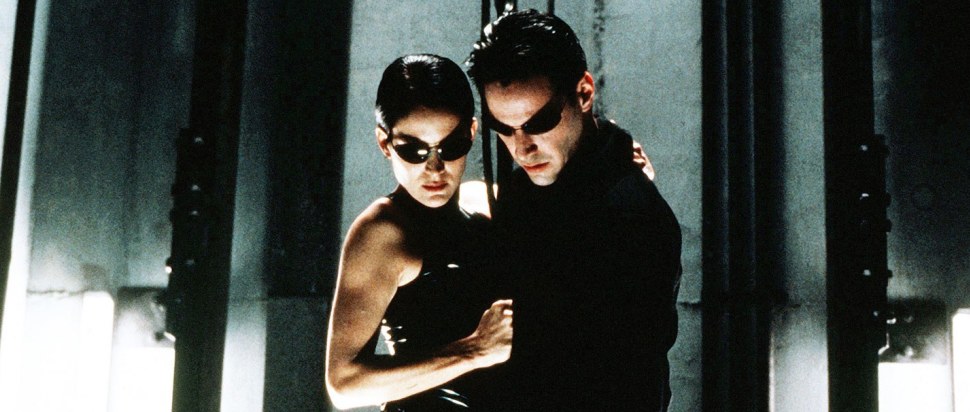The Matrix turns 20 and technology is still to be feared
With your personal data being sold wholesale and election tampering from afar, there's never been a better time to reappraise the pop philosophy and cyberpunk kung fu of The Matrix
It’s 1999 and the new millennium is looming menacingly on the horizon. Panic is building, news cycles are infested with apocalyptic predictions of Y2K – the millennium bug, a global cyber-catastrophe that will plunge us all into darkness on the stroke of midnight. There is a sense of almost Biblical retribution to these dark premonitions. We had become too reliant upon computers, wilfully conceded control for the sake of comfort and convenience. Now our sloth and ignorance would be punished by a mighty digital plague. Planes would fall from the sky, prison gates would fly open, hospitals would shut down, the entire infrastructure of our gleaming, modern world would implode the instant 99 rolled confusedly back into 00. The end was nigh.
This atmosphere of techno-panic could not possibly have been better suited to The Matrix’s ragged, neo-noir tale of computer overlords. Its hero, Neo, is introduced with Keanu Reeves’ pale face illuminated by the sickly green glow of his computer, hunched over in his dank apartment. The scene reeks of alienation and paranoia, the state a modern mind can dream its way into while bent over a screen, alone in the dark.
Picking up where James Cameron’s Terminator films left off, The Matrix took the idea of a self-conscious AI with a grudge against humanity, washed it in a semester or two of undergrad philosophy, and re-dressed it in the grimy cyberpunk stylings of Akira and Blade Runner. By combining cutting-edge computer wizardry with old-school martial arts moviemaking, the Wachowskis created a sci-fi epic that wore its influences on its worn leather sleeve while offering audiences something they had never seen before.
During Neo’s training, he is taught that the Matrix is a computer programme that can allow him to leap between rooftops and weave through bullets like Ali dodging punches. The experience for the audience was much the same: CGI had opened up new possibilities, bent the rules of reality.
Old and new at the same time, The Matrix is at once totally of its era and resolutely timeless. The flip-phones and dial-up connections date it at a glance, but it plays as well today as it did 20 years ago. One look at the sea of knock-offs, homages and parodies it inspired in the years that followed is enough to understand its monumental impact upon filmmaking and pop culture at large.
The Matrix was jacked directly into the zeitgeist of its moment, but its general message hasn’t faded over time. The Y2K predictions failed to come to pass, but we now live in an era where our personal details are harvested en masse and sold to mega-corporations, used to tailor fake news to our tastes and sway elections from afar; computers shape our reality.
The Matrix’s explicit philosophy never gets much beyond stoner ruminations about “what even is real?” but the general sense of it, the anxious off-ness of the whole thing, is rooted in the intuition that there is something wrong with the way the world is run. That we are all being kept in line by some form of sinister power, sleepwalking through our days at shitty desk jobs and nights plugged into the digital world’s plastic reality. There is a sense that technology – while allowing us to achieve incredible, mind-blowing things on a daily basis – is also being used to keep us docile, detached from one another and the world around us.
The question The Matrix asks, the one that festers in your mind long after you’re done being dazzled by the pop philosophy and cyberpunk kung fu: sure, you’re paranoid, but are you paranoid enough?
Glasgow Film Festival presents immersive screenings of The Matrix on Fri 22 Feb & Sat 23 Feb, 6pm, Argyle Street Arches
glasgowfilm.org/glasgow-film-festival/shows/the-matrix-at-argyle-street-arches-18
